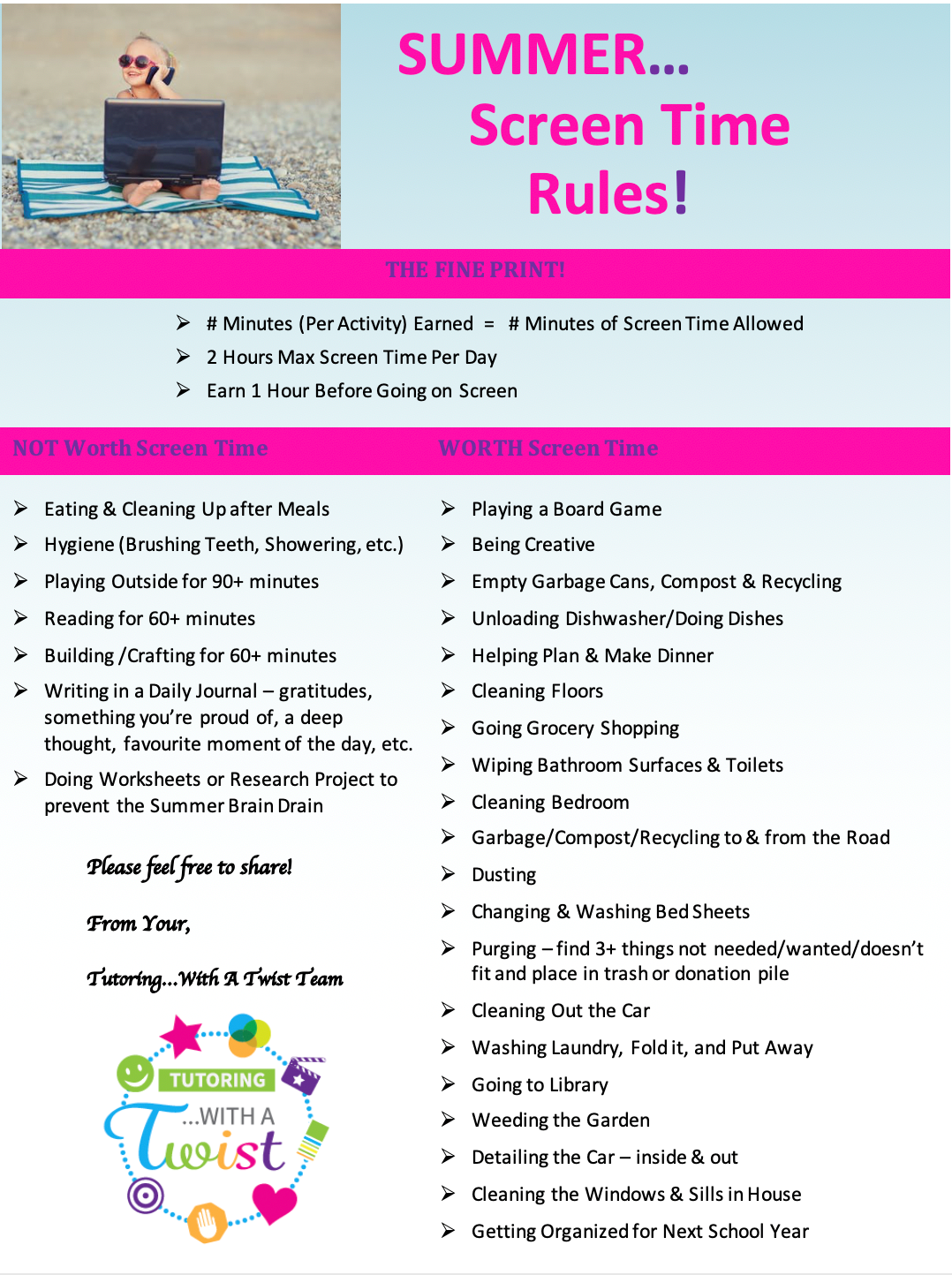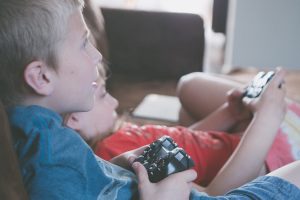We are just getting into summer now, and that means it’s time to let go of the school routine and settle into a new summer routine. Hopefully that routine includes tons of time outdoors, playing with friends, using imagination, getting creative, and being productive.(Print the list “Summer Bucket List: Over 100 Ideas” of awesome activities to do this summer!). But if your routine is a little too infused with screen time, it may be time to shake things up!

Summer Screen Time Rules
Here at Tutoring…With A Twist*, we’ve put together a simple but effective way to help kids balance their screen time with other activities—they have to earn it!
Every minute of earning activities is worth one minute of screen time. At least one hour of screen time must be earned before any screen time is redeemed, and only a maximum of two hours of screen time is allowed each day. At the end of the day, balances reset back to zero (except in special circumstances, at your discretion). And, of course, you can modify the list to make it easier (or harder!) to earn screen time.
Here’s the breakdown of the system you can print and use. If you walk into the home of our founder, Amber Scotchburn, you will be sure to see this laminated and posted on her family’s pantry door! (Right-click your mouse on the infographic and click “Save As…” or click and print it: Summer Time, Screen Time Rules printable! We are happy to answer any questions you may have!

Screen Time Recommendations
 Screen time recommendations change regularly as researchers understand more about screen time. As a general rule, the less screen time a person has, the better! But at what point is screen time actually damaging to a person’s development?
Screen time recommendations change regularly as researchers understand more about screen time. As a general rule, the less screen time a person has, the better! But at what point is screen time actually damaging to a person’s development?
That’s complicated. So complicated that no researchers have come up with a clear, definitive guideline and screen time “rules” are changing on a regular basis. Screen times rules are quite clear when kids are young (very little is best), but are almost impossible to nail down once kids get a bit older.
Instead of focusing on exact time, the Canadian Pediatrics Society (CPS) encourages healthy screen use and screen time behaviour:
- MANAGE – create a plan, be engaged, know when to turn screens off
- MEANINGFUL – make screen time meaningful & engaging, not mindless
- MODEL – walk the walk and show your kids how it’s done!
To make screen time for meaningful this summer, head over to our YouTube channel where we provide a wide variety of educational videos and audiobook readings!
Adolescent Brain Cognitive Development Project
 Balancing screen time with other activities is critical for brain development. We know at least that much is true. But technology and media use has expanded so quickly that it’s hard for parents to know with confidence just how much screen time is impacting their kids’ development. Fortunately, that may change in the future.
Balancing screen time with other activities is critical for brain development. We know at least that much is true. But technology and media use has expanded so quickly that it’s hard for parents to know with confidence just how much screen time is impacting their kids’ development. Fortunately, that may change in the future.
Adolescent Brain Cognitive Development (ABCD) is a project studying the impact of screen time on growing brains, and it’s going to have a major impact on the way we see screen time in the future. ABCD is a $300 Million study funded by the National Institute of Health (NIH), which is the U.S. government’s medical research arm, and is being executed by some of the world’s best medical research facilities.
The study is tracking 11,878 children from the ages of 9 and 10 as they journey into young adulthood, with a focus on their behavioural, biological, social and emotional development. In a nutshell, the study wants to figure out exactly how screen time impacts students’ future choices and opportunities. Does screen time impact sports? Academic success? The likelihood of smoking? We can all take guesses, but this study is using the scientific process to accurately answer these questions.
Interestingly, the ABCD started as a research project for other types of addiction: drugs and alcohol. But researchers quickly realized how prevalent screen time addiction is and modified the project to also consider screen use.
ABCD started their research in 2015, so only the baseline results from the first 7500 participants are currently available. However, the data is “open sourced” to all members of the medical community and, as a result, this study is likely to have a massive impact on the world’s understanding of screen time in the future.
For now, we have to follow our instincts and what we know. Everything in moderation! We can take steps to moderate our kids’ screen use and, in doing so, help ensure they are leading healthy, balanced lives.
What are you doing to balance screen time in your household? Let us know on Facebook!
*Services provided by With a Twist Education Ltd.
